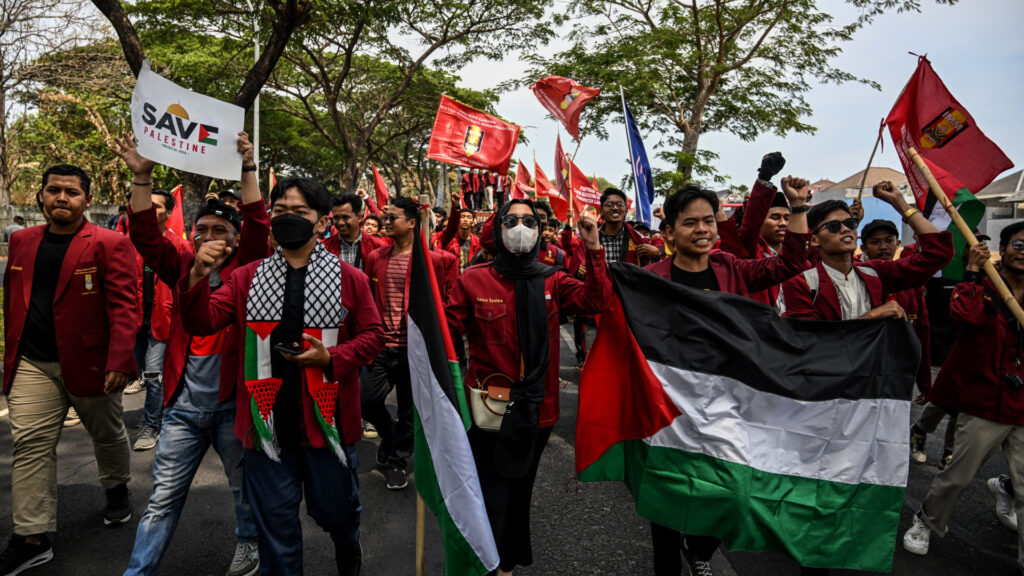In April, I warned that Indonesia’s quiet pipeline of students into Israeli institutions was not just diplomatically incoherent, it was morally indefensible.
That pipeline remains open, even as Indonesia amplifies its support for Palestine at the United Nations, sends thousands of tonnes of humanitarian aid and stages massive protests across the country. This contradiction is no longer subtle. It is a full-blown alarm.
In late July, another group of Indonesian agriculture students from East Nusa Tenggara departed for Israel as part of a nearly year-long internship at the Arava International Centre for Agricultural Training (Aicat).
This is not a fringe programme. It is part of a formal agreement signed in 2014 between Chinese-Indonesian businessman Agus Suherman and the Israeli-based training centre. A total of 100 Indonesian students were enrolled in the 2024-2025 cohort.
The Indonesian government may not officially recognise Israel, but this programme is recognition by another name. These students enter on Israeli visas, train at Israeli institutions and work on Israeli land – even as Palestinians are starved, bombed, displaced and imprisoned by the same state.
New MEE newsletter: Jerusalem Dispatch
Sign up to get the latest insights and analysis on
Israel-Palestine, alongside Turkey Unpacked and other MEE newsletters
This is not an agricultural exchange but complicity masquerading as pragmatism.
Hollow stance
On 3 August, thousands of Indonesians gathered at Jakarta’s National Monument, waving Palestinian flags and holding placards demanding justice for Gaza.
The protest was peaceful yet powerful – a collaboration between civil society groups and the Indonesian Ulama Council, supported by thousands of ordinary citizens. A day earlier, demonstrators had rallied outside the Egyptian embassy, calling for the opening of the Rafah crossing.
No amount of rice or aid Indonesia contributes can offset the political damage done by sending even a single student to Israel
These rallies were not symbolic acts. They reflected real rage, grief and solidarity.
And yet, they also revealed something deeply uncomfortable: that even as Indonesians mobilise in the streets, the country’s institutions are quietly undermining that resistance – making decisions that normalise and legitimise the very regime responsible for Gaza’s devastation.
Indonesia has sent substantial amounts of humanitarian aid to the Palestinian people. Just last week, Foreign Minister Sugiono announced an additional 10,000 tonnes of rice, along with a long-term cultivation initiative in Sumatra and Kalimantan to support Palestinian food security.
These are meaningful contributions. But no amount of rice can offset the political damage done by sending even a single student to Israel.
It is impossible to condemn apartheid while enrolling in its institutions, or wave the Palestinian flag in Jakarta while validating the systems that trample Palestinian lives. These contradictions do not cancel each other out but instead expose the entire framework of Indonesia’s pro-Palestine stance as hollow.
Whitewashing apartheid
Some argue that academic exchange programmes are apolitical, and that students are simply there to learn agriculture, not endorse an apartheid regime.
But that is a fiction.

War on Gaza: Universities that resist BDS are at risk of losing legitimacy
Read More »
Israeli agricultural “advances” are not developed in a vacuum. They are achieved on stolen land, with stolen water and through an economy built on occupation.
While Indonesian students irrigate crops in the Arava desert, Palestinian farmers watch their orchards wither under blockade and bombardment. Education, in this case, is not neutral. It is a tool of whitewashing.
Moreover, Aicat is not a Unesco facility. It is a cog in a machine built to showcase Israel’s technological prowess while obscuring the brutality of its policies.
Every Indonesian student who participates becomes – knowingly or not – a testimonial: proof that even critics of Israel are willing to engage, given the right incentives.
What otherwise would have been a knowledge exchange is simply a trade of principle for access.
No excuse
Indonesia’s policy of non-recognition was never just bureaucratic. It was a moral line that has been crossed, marked not by headlines but by quiet departures to Tel Aviv airport and internships stripped of political context.
This is how normalisation happens: not through embassies, but through loopholes, internships and the slow erosion of outrage by routine.
Follow Middle East Eye’s live coverage of Israel’s genocide in Gaza
Indonesia has alternatives. If the goal is agricultural advancement, countries such as Japan, South Korea, India, Turkey and Brazil offer high-tech training without compromising their values.
There is no excuse for choosing a country that demolishes homes in Jenin, bombs hospitals in Rafah, and jails children from Hebron to Nablus.
Palestine does not need charity from Indonesia. It needs solidarity, and solidarity requires sacrifice
Palestine does not need charity from Indonesia. It needs solidarity, and solidarity requires sacrifice – even if that means giving up access to cutting-edge irrigation systems, especially when that technology is soaked in injustice.
Indonesia must decide: is Palestine a political cause or a branding tool? Is the occupation a red line or a grey area? Is the suffering in Gaza just another headline – or a moral call to action?
If Indonesian leaders want their protests to matter, their donations to mean something and their statements at the UN to carry weight, then the country must stop enabling a system it claims to oppose.
No more students should be sent to Israel – not now, not ever, not under any excuse.
The views expressed in this article belong to the author and do not necessarily reflect the editorial policy of Middle East Eye.

